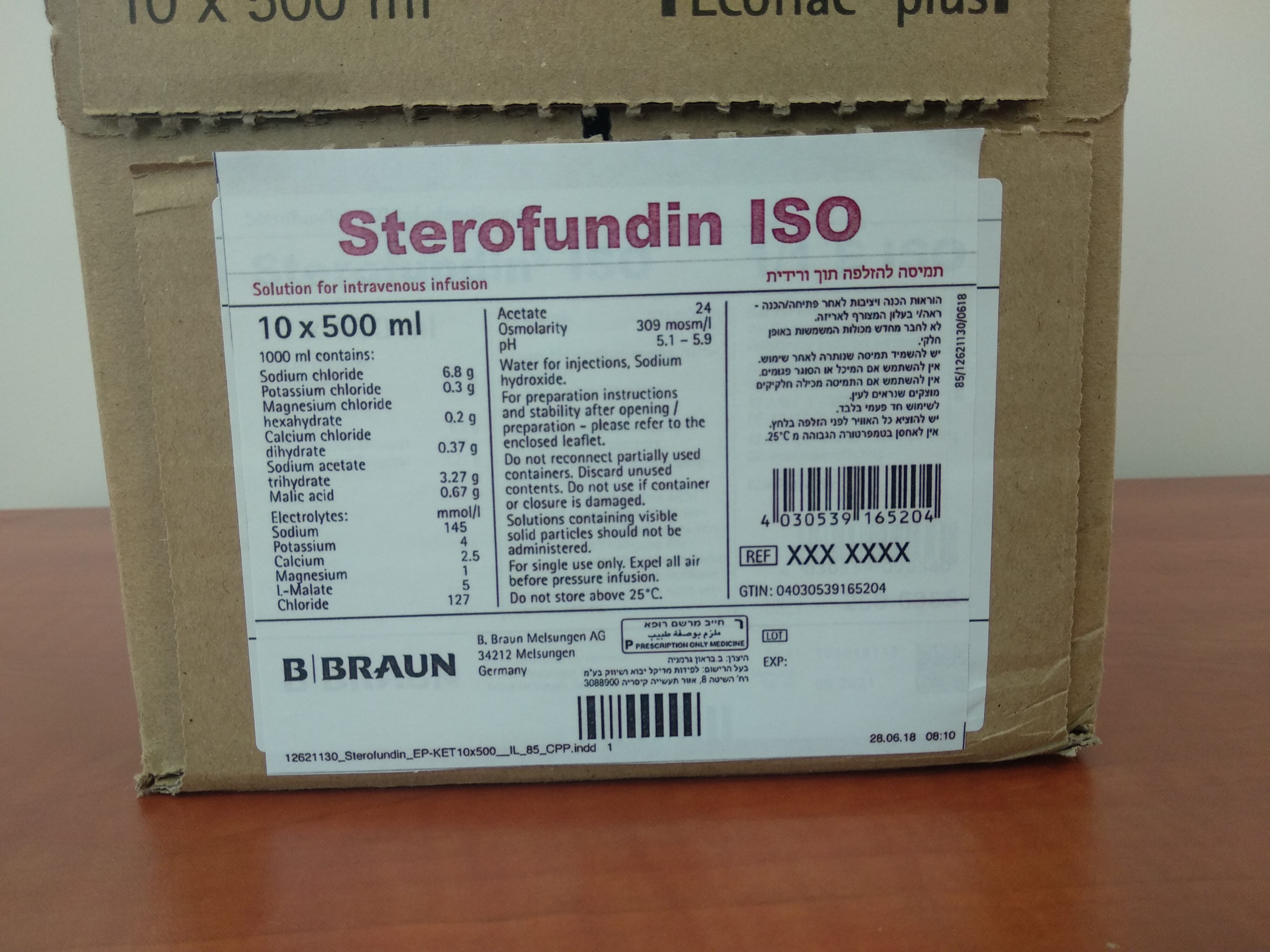Quest for the right Drug

סטירופנדין איזו STEROFUNDIN ISO (CALCIUM CHLORIDE DIHYDRATE, L-MALIC ACID, MAGNESIUM CHLORIDE HEXAHYDRATE, POTASSIUM CHLORIDE, SODIUM ACETATE TRIHYDRATE, SODIUM CHLORIDE)
תרופה במרשם
תרופה בסל
נרקוטיקה
ציטוטוקסיקה
צורת מתן:
תוך-ורידי : I.V
צורת מינון:
תמיסה לאינפוזיה : SOLUTION FOR INFUSION
עלון לרופא
מינוניםPosology התוויות
Indications תופעות לוואי
Adverse reactions התוויות נגד
Contraindications אינטראקציות
Interactions מינון יתר
Overdose הריון/הנקה
Pregnancy & Lactation אוכלוסיות מיוחדות
Special populations תכונות פרמקולוגיות
Pharmacological properties מידע רוקחי
Pharmaceutical particulars אזהרת שימוש
Special Warning עלון לרופא
Physicians Leaflet
Overdose : מינון יתר
4.9 Overdose Overdose or an infusion rate that is too fast may lead to water and sodium overload with a risk of oedema, particularly when renal sodium excretion is impaired. In this case, renal dialysis may be necessary. Excessive administration of potassium may lead to the development of hyperkalaemia, especially in patients with renal impairment. Symptoms include paraesthesia of the extremities, muscle weakness, paralysis, cardiac arrhythmias, heart block, cardiac arrest and mental confusion. Treatment of hyperkalaemia involves the administration of calcium, insulin (with glucose) and sodium bicarbonate. The use of exchange resins or haemodialysis may be required. Excessive parenteral administration of magnesium salts leads to hypermagnesaemia, the most important signs of which are loss of deep tendon reflexes and respiratory depression, both due to neuromuscular blockade. Other symptoms of hypermagnesaemia may include: Nausea, vomiting, flushing, thirst, hypotension due to peripheral vasodilatation, drowsiness, confusion, muscle weakness, bradycardia, coma and cardiac arrest. Excessive administration of chloride salts may cause a loss of bicarbonate with an acidifying effect of the blood. Excessive administration of compounds, such as acetate and malate, which are metabolised to form bicarbonate, may lead to metabolic alkalosis, especially in patients with impaired renal function. Symptoms may include: Mood changes, tiredness, shortness of breath, muscle weakness and cardiac arrhythmia. Patients with additional hypocalcaemia may develop muscle hypertonicity, twitching and tetany. Treatment of metabolic alkalosis associated with an increase in bicarbonate consists mainly of appropriate correction of the fluid and electrolyte balance. Excessive administration of calcium salts may lead to hypercalcaemia. Symptoms may include: Anorexia, nausea, vomiting, constipation, abdominal pain, muscle weakness, mental disturbances, polydipsia, polyuria, nephrocalcinosis, renal calculi and, in severe cases, cardiac arrhythmias and coma. Too rapid intravenous injection of calcium salts may also lead to many of the symptoms of hypercalcaemia, as well as to a chalky taste, hot flushes and peripheral vasodilation. Mild asymptomatic hypercalcaemia will usually resolve on discontinuing the administration of calcium and other contributory drugs such as vitamin D. Severe hypercalcaemia is to be treated immediately with loop diuretics, haemodialysis, calcitonin, bisphosphonates or trisodium edetate. When overdose is related to medications added to the solution for infusion, the signs and symptoms of overdose will be related to the nature of the additive being used. In the event of accidental overdose, treatment should be discontinued and the patient should be observed for the appropriate signs and symptoms related to the drug administered. The relevant symptomatic and supportive measures should be provided as necessary.

שימוש לפי פנקס קופ''ח כללית 1994
לא צוין
תאריך הכללה מקורי בסל
לא צוין
הגבלות
לא צוין
מידע נוסף
עלון מידע לרופא
17.11.22 - עלון לרופאעלון מידע לצרכן
17.11.22 - החמרה לעלוןלתרופה במאגר משרד הבריאות
סטירופנדין איזו